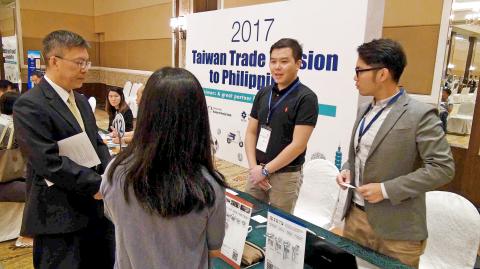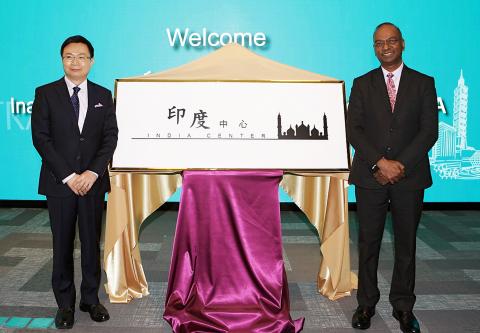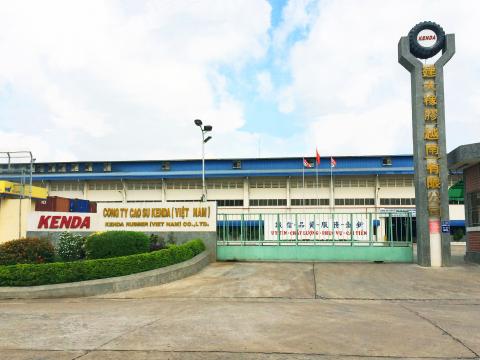President Tsai Ing-wen’s (蔡英文) government has been urging local businesses to bolster their trade ties with 18 nations in South and Southeast Asia to mitigate Taiwan’s economic reliance on China.
Under the “new southbound policy” introduced last year, the government aims to develop reciprocal trade deals by offering credit guarantee funds and renewing bilateral investment protection agreements with the nations targeted by the policy.
“It is not the first time that the government is encouraging companies to shift investments to Southeast Asia, but the mindset of the new policy is totally different,” said Y.C. Tsai (蔡允中), a negotiator from the Office of Trade Negotiations, the Cabinet-level agency responsible for implementing the policy.

Photo: CNA
“The southbound policies of former administrations were more supply-oriented, as policymakers back then only thought about how to export Taiwanese products to the region,” Y.C. Tsai said in an interview earlier this month.
However, the Democratic Progressive Party government hopes to shift the focus to the actual needs of Southeast Asia, taking local characteristics into account, he said.
Walter Yeh (葉明水), executive president of the Taiwan External Trade Development Council, a trade promotion agency, echoed those remarks.

Photo courtesy of Taiwan External Trade Development Council
Taiwanese firms need to identify the key differences among Southeast Asian nations and must be sensitive to the rapid changes in customer needs there to stay competitive, Yeh said on Friday last week.
“The top priority [for local companies] is to develop a profound understanding of Southeast Asian nations and get rid of stereotypes about them,” Yeh said.
The council is working on several projects to help local firms obtain halal certification, he said.

Photo courtesy of Kenda Rubber Industrial Co
For example, pork, alcohol and intoxicating beverages are prohibited in the Islamic market, Yeh said.
In April, the council launched the Taiwan Halal Center in Taipei as part of its efforts to provide information to the market and match business partners who show an interest in Southeast Asia.
The council hopes to help Taiwanese companies grab more business opportunities through collaborations with e-commerce operators in Southeast Asia, Yeh said.
Blibli.com, the largest online shopping platform in Indonesia, will start selling Taiwanese-made cosmetic and maternal and infant care products in the third quarter, the council said.
TIREMAKERS
Some Taiwanese firms have launched plans to expand their presence in Southeast Asian markets, including Kenda Rubber Industrial Co (建大輪胎), one of the biggest tire manufacturers in the nation.
Kenda’s plant in Vietnam has been in operation for 20 years, with daily a production capacity of 35,000 motorcycle tires and 40,000 bicycle tires, while its factory in Indonesia — which started production last month — can produce 200,000 bicycle tires per day.
The decision to expand capacity in Southeast Asia reflects not only the attraction of lower labor costs there, but also a need to increase exposure to potential customers in the region, a company official told the Taipei Times.
“We had to form a joint venture with Vietnamese companies to conform to local rules regulating foreign investments there,” the official said, adding that the restrictions put immense pressure on the plant’s profitability in the early years.
However, the challenge has not stopped the Changhua-based firm from undertaking more investments in Southeast Asian markets, backed by a robust demand for vehicles in the region.
Kenda is also considering an expansion of its footprint in India in light of the high number of motorcycle users there, the official said, without providing a timetable.
TEXTILE INDUSTRY
Two leading Taiwanese companies from the labor-intensive textile and apparel industry — Eclat Textile Co (儒鴻) and Makalot Industrial Co (聚陽) — plan to expand their operations in Southeast Asia, eyeing lower personnel costs and emerging industry clusters in the region.
Eclat in December last year dissolved its wholly owned clothing plant in China, primarily due to soaring labor costs.
However, the company said it plans to raise output at two of its Vietnamese plants this year, which is expected to boost its monthly production capacity from nearly 6.2 million units of clothing to 7.5 million.
Meanwhile, Makalot said it is building new production lines at its Vietnamese and Indonesian plants, which are expected to lift its overall capacity by 10 percent this year from last year’s 13 million units of clothing per month.
ONLINE SERVICES
Some online service providers have also expressed interest in Southeast Asian markets, saying the expanding middle class in the region is expected to be the next growth driver.
“Given increasingly tough competition in Taiwan’s saturated market, we are seeking business potential in new markets,” said Sega Cheng (程世嘉), chief executive officer of iKala Interactive Media Inc (愛卡拉互動媒體), which offers live-streaming cloud services.
It is still not too late for Taiwanese service providers to expand their presence in Southeast Asia, Cheng said by telephone on Friday last week, citing a lack of Internet infrastructure and experienced talent in the region.
The Taipei-based service provider plans to tap into Indonesia’s and Thailand’s booming Internet service market in the coming years, due to wider consumer acceptance of foreign brands there, Cheng said.
The firm is also looking to collaborate with other Taiwanese firms, especially those that have been running businesses in Southeast Asia for decades, to capitalize on existing social networks, he said.
“Our business partners [in Indonesia and Thailand] might be in the human resources or manufacturing industries, as they are also eager for transformation,” Cheng said.
Addressing the challenges of expanding the firm’s footprint in emerging markets, Cheng said one key problem for Taiwanese service providers is a lack of financial support, which hampers the development of promising start-ups.
“It is not easy for small and medium-sized service providers to obtain corporate loans from banks, as the design of financial systems [in Taiwan] is not friendly to start-ups,” he said, referring to the absence of angel investors.
Apart from considering financial risks, Taiwanese companies should develop strategies to benefit from tax incentives offered by the governments of Southeast Asian nations, Deloitte Taiwan partner Jerry Gung (龔則立) said on Tuesday.
Gung, who provides consulting services to Taiwanese firms planning to expand their business in Thailand, said some Southeast Asian nations — such as Thailand, Malaysia and Vietnam — have been trying to attract foreign investment by providing tax exemptions.
Thailand’s Board of Investment offers corporate income tax exemption up to 13 years, and import duty exemption on goods imported for research and development purposes, he said.
“It is important for Taiwanese companies to rethink how to conform with local regulations in emerging markets, as what made you so successful in the past might not work so smoothly now,” he said, citing Southeast Asian nations’ tighter controls against money laundering and tax evasion.
“Do not deem these nations backward economies or try to cut corners. The benefits of collaboration should be reciprocal,” Gung said.
The Taipei Times is to publish a series of articles focusing on President Tsai Ing-wen’s government’s “new southbound policy” in collaboration with the Office of Trade Negotiations of the Executive Yuan. The articles are to be printed every Saturday.

Chinese Nationalist Party (KMT) Chairman Eric Chu (朱立倫), spokeswoman Yang Chih-yu (楊智伃) and Legislator Hsieh Lung-chieh (謝龍介) would be summoned by police for questioning for leading an illegal assembly on Thursday evening last week, Minister of the Interior Liu Shyh-fang (劉世芳) said today. The three KMT officials led an assembly outside the Taipei City Prosecutors’ Office, a restricted area where public assembly is not allowed, protesting the questioning of several KMT staff and searches of KMT headquarters and offices in a recall petition forgery case. Chu, Yang and Hsieh are all suspected of contravening the Assembly and Parade Act (集會遊行法) by holding

PRAISE: Japanese visitor Takashi Kubota said the Taiwanese temple architecture images showcased in the AI Art Gallery were the most impressive displays he saw Taiwan does not have an official pavilion at the World Expo in Osaka, Japan, because of its diplomatic predicament, but the government-backed Tech World pavilion is drawing interest with its unique recreations of works by Taiwanese artists. The pavilion features an artificial intelligence (AI)-based art gallery showcasing works of famous Taiwanese artists from the Japanese colonial period using innovative technologies. Among its main simulated displays are Eastern gouache paintings by Chen Chin (陳進), Lin Yu-shan (林玉山) and Kuo Hsueh-hu (郭雪湖), who were the three young Taiwanese painters selected for the East Asian Painting exhibition in 1927. Gouache is a water-based

Taiwan would welcome the return of Honduras as a diplomatic ally if its next president decides to make such a move, Minister of Foreign Affairs Lin Chia-lung (林佳龍) said yesterday. “Of course, we would welcome Honduras if they want to restore diplomatic ties with Taiwan after their elections,” Lin said at a meeting of the legislature’s Foreign Affairs and National Defense Committee, when asked to comment on statements made by two of the three Honduran presidential candidates during the presidential campaign in the Central American country. Taiwan is paying close attention to the region as a whole in the wake of a

OFF-TARGET: More than 30,000 participants were expected to take part in the Games next month, but only 6,550 foreign and 19,400 Taiwanese athletes have registered Taipei city councilors yesterday blasted the organizers of next month’s World Masters Games over sudden timetable and venue changes, which they said have caused thousands of participants to back out of the international sporting event, among other organizational issues. They also cited visa delays and political interference by China as reasons many foreign athletes are requesting refunds for the event, to be held from May 17 to 30. Jointly organized by the Taipei and New Taipei City governments, the games have been rocked by numerous controversies since preparations began in 2020. Taipei City Councilor Lin Yen-feng (林延鳳) said yesterday that new measures by